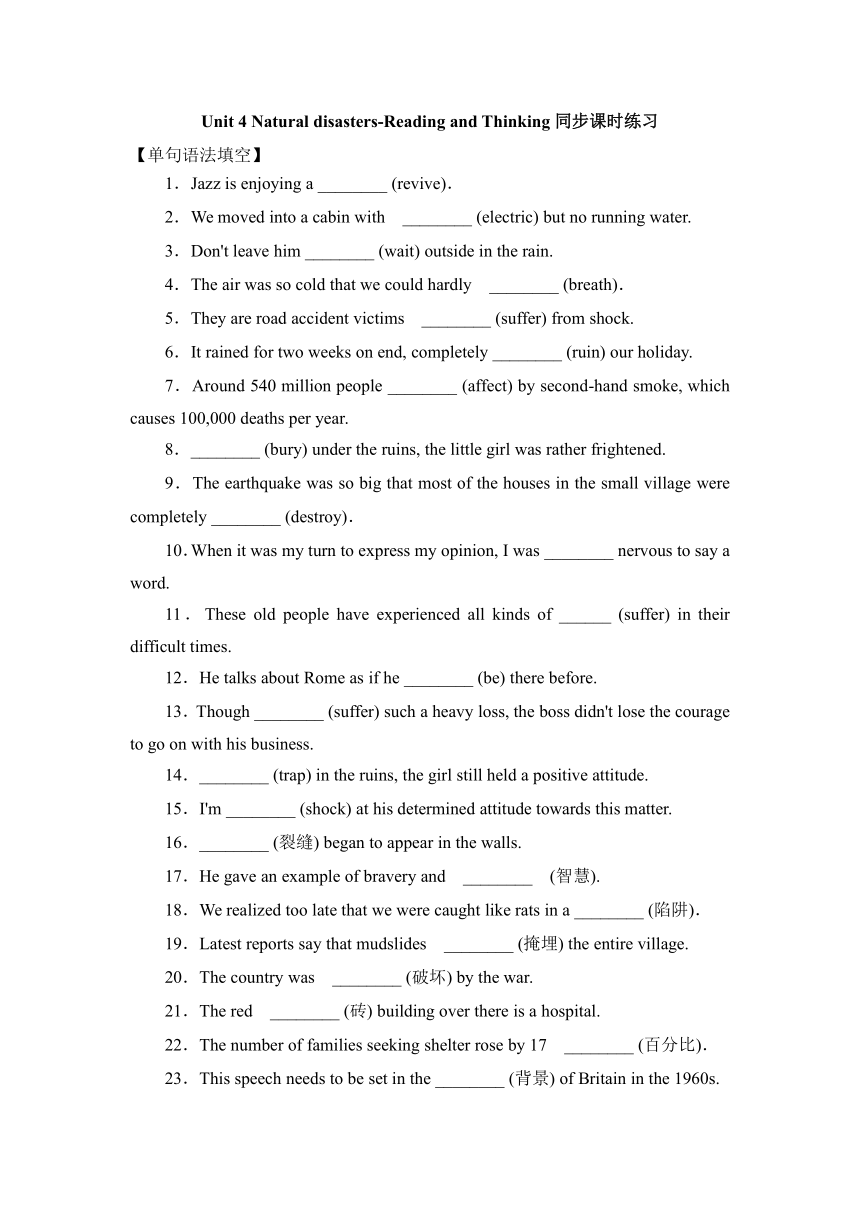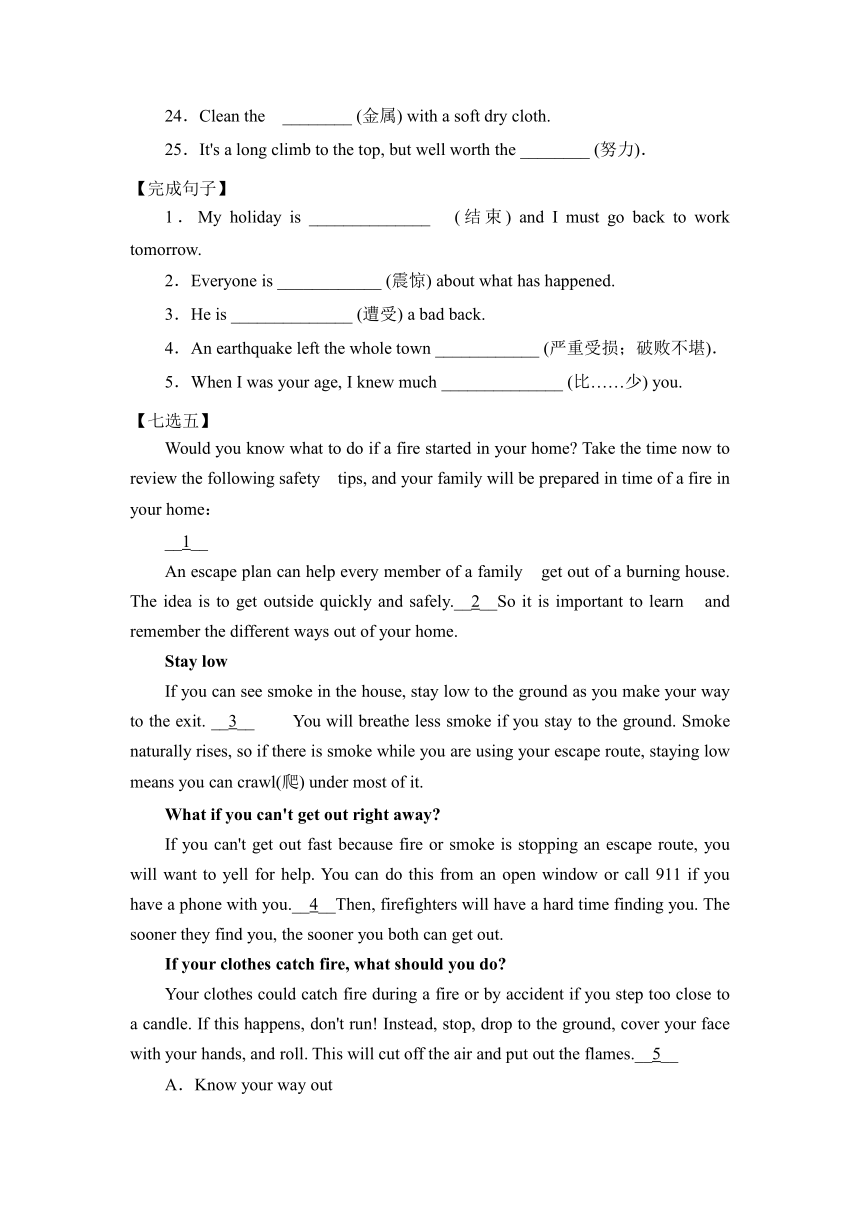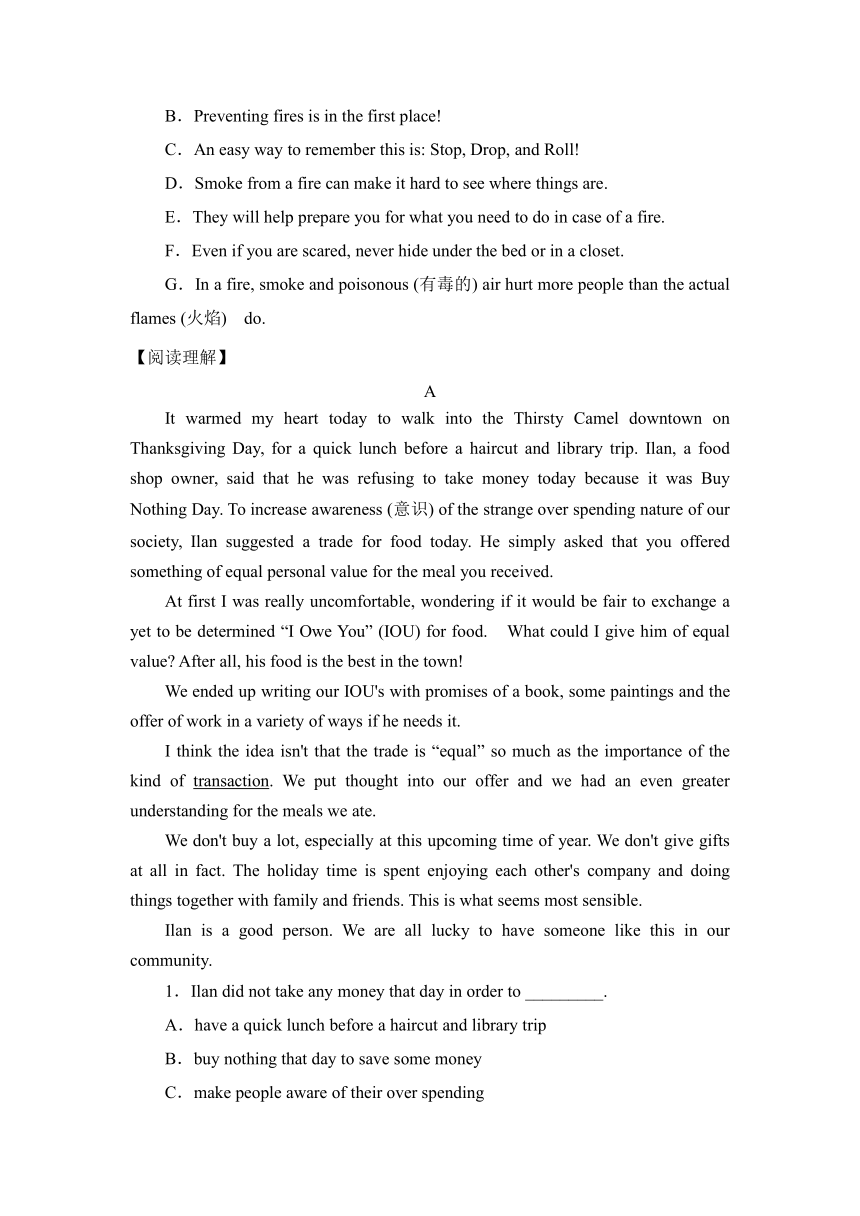人教版(2019)必修一Unit 4 Natural disasters-Reading and Thinking同步课时练习(有答案)
文档属性
| 名称 | 人教版(2019)必修一Unit 4 Natural disasters-Reading and Thinking同步课时练习(有答案) |

|
|
| 格式 | doc | ||
| 文件大小 | 52.5KB | ||
| 资源类型 | 教案 | ||
| 版本资源 | 人教版(2019) | ||
| 科目 | 英语 | ||
| 更新时间 | 2022-10-26 00:00:00 | ||
图片预览



文档简介
Unit 4 Natural disasters-Reading and Thinking同步课时练习
【单句语法填空】
1.Jazz is enjoying a ________ (revive).
2.We moved into a cabin with ________ (electric) but no running water.
3.Don't leave him ________ (wait) outside in the rain.
4.The air was so cold that we could hardly ________ (breath).
5.They are road accident victims ________ (suffer) from shock.
6.It rained for two weeks on end, completely ________ (ruin) our holiday.
7.Around 540 million people ________ (affect) by second hand smoke, which causes 100,000 deaths per year.
8.________ (bury) under the ruins, the little girl was rather frightened.
9.The earthquake was so big that most of the houses in the small village were completely ________ (destroy).
10.When it was my turn to express my opinion, I was ________ nervous to say a word.
11.These old people have experienced all kinds of ______ (suffer) in their difficult times.
12.He talks about Rome as if he ________ (be) there before.
13.Though ________ (suffer) such a heavy loss, the boss didn't lose the courage to go on with his business.
14.________ (trap) in the ruins, the girl still held a positive attitude.
15.I'm ________ (shock) at his determined attitude towards this matter.
16.________ (裂缝) began to appear in the walls.
17.He gave an example of bravery and ________ (智慧).
18.We realized too late that we were caught like rats in a ________ (陷阱).
19.Latest reports say that mudslides ________ (掩埋) the entire village.
20.The country was ________ (破坏) by the war.
21.The red ________ (砖) building over there is a hospital.
22.The number of families seeking shelter rose by 17 ________ (百分比).
23.This speech needs to be set in the ________ (背景) of Britain in the 1960s.
24.Clean the ________ (金属) with a soft dry cloth.
25.It's a long climb to the top, but well worth the ________ (努力).
【完成句子】
1.My holiday is ______________ (结束) and I must go back to work tomorrow.
2.Everyone is ____________ (震惊) about what has happened.
3.He is ______________ (遭受) a bad back.
4.An earthquake left the whole town ____________ (严重受损;破败不堪).
5.When I was your age, I knew much ______________ (比……少) you.
【七选五】
Would you know what to do if a fire started in your home Take the time now to review the following safety tips, and your family will be prepared in time of a fire in your home:
__1__
An escape plan can help every member of a family get out of a burning house. The idea is to get outside quickly and safely.__2__So it is important to learn and remember the different ways out of your home.
Stay low
If you can see smoke in the house, stay low to the ground as you make your way to the exit. __3__ You will breathe less smoke if you stay to the ground. Smoke naturally rises, so if there is smoke while you are using your escape route, staying low means you can crawl(爬) under most of it.
What if you can't get out right away
If you can't get out fast because fire or smoke is stopping an escape route, you will want to yell for help. You can do this from an open window or call 911 if you have a phone with you.__4__Then, firefighters will have a hard time finding you. The sooner they find you, the sooner you both can get out.
If your clothes catch fire, what should you do
Your clothes could catch fire during a fire or by accident if you step too close to a candle. If this happens, don't run! Instead, stop, drop to the ground, cover your face with your hands, and roll. This will cut off the air and put out the flames.__5__
A.Know your way out
B.Preventing fires is in the first place!
C.An easy way to remember this is: Stop, Drop, and Roll!
D.Smoke from a fire can make it hard to see where things are.
E.They will help prepare you for what you need to do in case of a fire.
F.Even if you are scared, never hide under the bed or in a closet.
G.In a fire, smoke and poisonous (有毒的) air hurt more people than the actual flames (火焰) do.
【阅读理解】
A
It warmed my heart today to walk into the Thirsty Camel downtown on Thanksgiving Day, for a quick lunch before a haircut and library trip. Ilan, a food shop owner, said that he was refusing to take money today because it was Buy Nothing Day. To increase awareness (意识) of the strange over spending nature of our society, Ilan suggested a trade for food today. He simply asked that you offered something of equal personal value for the meal you received.
At first I was really uncomfortable, wondering if it would be fair to exchange a yet to be determined “I Owe You” (IOU) for food. What could I give him of equal value After all, his food is the best in the town!
We ended up writing our IOU's with promises of a book, some paintings and the offer of work in a variety of ways if he needs it.
I think the idea isn't that the trade is “equal” so much as the importance of the kind of transaction. We put thought into our offer and we had an even greater understanding for the meals we ate.
We don't buy a lot, especially at this upcoming time of year. We don't give gifts at all in fact. The holiday time is spent enjoying each other's company and doing things together with family and friends. This is what seems most sensible.
Ilan is a good person. We are all lucky to have someone like this in our community.
1.Ilan did not take any money that day in order to _________.
A.have a quick lunch before a haircut and library trip
B.buy nothing that day to save some money
C.make people aware of their over spending
D.trade for something of equal value in return
2.For the meal, the author finally offered Ilan ________.
A.some promises B.a book
C.some paintings D.work in different ways
3.Which of the following is closest in meaning to the underlined word “transaction”?
A.transport B.trade
C.meal D.giving
4.What is the author's attitude to Buy Nothing Day
A.Disagreeable. B.Meaningless.
C.Supportive. D.Doubtful.
B
If the crust (外壳) of the earth were not pretty solid (坚固的), it would be shaking and moving up and down frequently. However, there are places in the rocks of the earth's crust where it isn't strongly held together — where faults exist. Along the faults, one rock might push against another with great force. The energy is changed to vibration in the rocks, so they begin to shake and we have an earthquake!
The most famous one in North America was the San Francisco earthquake of 1906. Seven hundred people died and property (财产) damage amounted to about $425,000,000. The greatest destruction came from the fires that followed the quake.
One of the most famous earthquakes in Europe took place in Lisbon, Portugal, in 1755. The city was destroyed and at least thirty thousand people were killed. In 1908, in Calabria and Sicily, a quake killed about seventy five thousand people. In 1915, in central Italy, hundreds of towns and villages were damaged and thirty thousand people were killed.
Two great earthquakes that caused great damage in Asia took place in Tokyo, Japan, and in Gansu Province in China. The Tokyo quake of 1923 killed more than one hundred thousand people and destroyed the city and the city of Yokohama, too. The Chinese quake in 1920 covered more than three hundred square miles and killed about two hundred thousand people.
5.The first paragraph mainly tells us ________.
A.where earthquakes happen
B.how earthquakes happen
C.the damage caused by earthquakes
D.famous earthquakes in the world
6.The underlined word “vibration” in the first paragraph probably means “________”.
A.shaking B.force
C.energy D.losing
7.Which of the following is the correct order of the years when the earthquakes happened
①the San Francisco earthquake
②the earthquake in Lisbon, Portugal
③the earthquake in Calabria and Sicily
④the earthquake in central Italy
⑤the earthquake in Gansu Province
⑥the Tokyo quake
A.③④⑤⑥②① B.⑤⑥②①③④
C.②①③④⑤⑥ D.①③④②⑤⑥
8.We can infer from the passage that ________.
A.the earth's crust in Europe is weaker than that in other places
B.the fires following the San Francisco earthquake caused more damage than the earthquake did
C.there were 75,000 people killed in the San Francisco earthquake
D.the city of Yokohama was not greatly influenced by the Tokyo quake
参考答案:
【单句语法填空】
1revival
2electricity
3waiting
4breathe
5suffering
6.ruining
7.are affected
8.Buried
9.destroyed
10.too
11.sufferings
12.had been
13.suffering
14.Trapped
15.shocked
16Cracks
17wisdom
18trap
19buried
20ruined
21brick
22per cent
23context
24metal
25effort
【完成句子】
1at an end
2in shock
3suffering from
4in ruins
5less than
【七选五】
ADGFC
【阅读理解】
1-4CABC
5-8BACB
【单句语法填空】
1.Jazz is enjoying a ________ (revive).
2.We moved into a cabin with ________ (electric) but no running water.
3.Don't leave him ________ (wait) outside in the rain.
4.The air was so cold that we could hardly ________ (breath).
5.They are road accident victims ________ (suffer) from shock.
6.It rained for two weeks on end, completely ________ (ruin) our holiday.
7.Around 540 million people ________ (affect) by second hand smoke, which causes 100,000 deaths per year.
8.________ (bury) under the ruins, the little girl was rather frightened.
9.The earthquake was so big that most of the houses in the small village were completely ________ (destroy).
10.When it was my turn to express my opinion, I was ________ nervous to say a word.
11.These old people have experienced all kinds of ______ (suffer) in their difficult times.
12.He talks about Rome as if he ________ (be) there before.
13.Though ________ (suffer) such a heavy loss, the boss didn't lose the courage to go on with his business.
14.________ (trap) in the ruins, the girl still held a positive attitude.
15.I'm ________ (shock) at his determined attitude towards this matter.
16.________ (裂缝) began to appear in the walls.
17.He gave an example of bravery and ________ (智慧).
18.We realized too late that we were caught like rats in a ________ (陷阱).
19.Latest reports say that mudslides ________ (掩埋) the entire village.
20.The country was ________ (破坏) by the war.
21.The red ________ (砖) building over there is a hospital.
22.The number of families seeking shelter rose by 17 ________ (百分比).
23.This speech needs to be set in the ________ (背景) of Britain in the 1960s.
24.Clean the ________ (金属) with a soft dry cloth.
25.It's a long climb to the top, but well worth the ________ (努力).
【完成句子】
1.My holiday is ______________ (结束) and I must go back to work tomorrow.
2.Everyone is ____________ (震惊) about what has happened.
3.He is ______________ (遭受) a bad back.
4.An earthquake left the whole town ____________ (严重受损;破败不堪).
5.When I was your age, I knew much ______________ (比……少) you.
【七选五】
Would you know what to do if a fire started in your home Take the time now to review the following safety tips, and your family will be prepared in time of a fire in your home:
__1__
An escape plan can help every member of a family get out of a burning house. The idea is to get outside quickly and safely.__2__So it is important to learn and remember the different ways out of your home.
Stay low
If you can see smoke in the house, stay low to the ground as you make your way to the exit. __3__ You will breathe less smoke if you stay to the ground. Smoke naturally rises, so if there is smoke while you are using your escape route, staying low means you can crawl(爬) under most of it.
What if you can't get out right away
If you can't get out fast because fire or smoke is stopping an escape route, you will want to yell for help. You can do this from an open window or call 911 if you have a phone with you.__4__Then, firefighters will have a hard time finding you. The sooner they find you, the sooner you both can get out.
If your clothes catch fire, what should you do
Your clothes could catch fire during a fire or by accident if you step too close to a candle. If this happens, don't run! Instead, stop, drop to the ground, cover your face with your hands, and roll. This will cut off the air and put out the flames.__5__
A.Know your way out
B.Preventing fires is in the first place!
C.An easy way to remember this is: Stop, Drop, and Roll!
D.Smoke from a fire can make it hard to see where things are.
E.They will help prepare you for what you need to do in case of a fire.
F.Even if you are scared, never hide under the bed or in a closet.
G.In a fire, smoke and poisonous (有毒的) air hurt more people than the actual flames (火焰) do.
【阅读理解】
A
It warmed my heart today to walk into the Thirsty Camel downtown on Thanksgiving Day, for a quick lunch before a haircut and library trip. Ilan, a food shop owner, said that he was refusing to take money today because it was Buy Nothing Day. To increase awareness (意识) of the strange over spending nature of our society, Ilan suggested a trade for food today. He simply asked that you offered something of equal personal value for the meal you received.
At first I was really uncomfortable, wondering if it would be fair to exchange a yet to be determined “I Owe You” (IOU) for food. What could I give him of equal value After all, his food is the best in the town!
We ended up writing our IOU's with promises of a book, some paintings and the offer of work in a variety of ways if he needs it.
I think the idea isn't that the trade is “equal” so much as the importance of the kind of transaction. We put thought into our offer and we had an even greater understanding for the meals we ate.
We don't buy a lot, especially at this upcoming time of year. We don't give gifts at all in fact. The holiday time is spent enjoying each other's company and doing things together with family and friends. This is what seems most sensible.
Ilan is a good person. We are all lucky to have someone like this in our community.
1.Ilan did not take any money that day in order to _________.
A.have a quick lunch before a haircut and library trip
B.buy nothing that day to save some money
C.make people aware of their over spending
D.trade for something of equal value in return
2.For the meal, the author finally offered Ilan ________.
A.some promises B.a book
C.some paintings D.work in different ways
3.Which of the following is closest in meaning to the underlined word “transaction”?
A.transport B.trade
C.meal D.giving
4.What is the author's attitude to Buy Nothing Day
A.Disagreeable. B.Meaningless.
C.Supportive. D.Doubtful.
B
If the crust (外壳) of the earth were not pretty solid (坚固的), it would be shaking and moving up and down frequently. However, there are places in the rocks of the earth's crust where it isn't strongly held together — where faults exist. Along the faults, one rock might push against another with great force. The energy is changed to vibration in the rocks, so they begin to shake and we have an earthquake!
The most famous one in North America was the San Francisco earthquake of 1906. Seven hundred people died and property (财产) damage amounted to about $425,000,000. The greatest destruction came from the fires that followed the quake.
One of the most famous earthquakes in Europe took place in Lisbon, Portugal, in 1755. The city was destroyed and at least thirty thousand people were killed. In 1908, in Calabria and Sicily, a quake killed about seventy five thousand people. In 1915, in central Italy, hundreds of towns and villages were damaged and thirty thousand people were killed.
Two great earthquakes that caused great damage in Asia took place in Tokyo, Japan, and in Gansu Province in China. The Tokyo quake of 1923 killed more than one hundred thousand people and destroyed the city and the city of Yokohama, too. The Chinese quake in 1920 covered more than three hundred square miles and killed about two hundred thousand people.
5.The first paragraph mainly tells us ________.
A.where earthquakes happen
B.how earthquakes happen
C.the damage caused by earthquakes
D.famous earthquakes in the world
6.The underlined word “vibration” in the first paragraph probably means “________”.
A.shaking B.force
C.energy D.losing
7.Which of the following is the correct order of the years when the earthquakes happened
①the San Francisco earthquake
②the earthquake in Lisbon, Portugal
③the earthquake in Calabria and Sicily
④the earthquake in central Italy
⑤the earthquake in Gansu Province
⑥the Tokyo quake
A.③④⑤⑥②① B.⑤⑥②①③④
C.②①③④⑤⑥ D.①③④②⑤⑥
8.We can infer from the passage that ________.
A.the earth's crust in Europe is weaker than that in other places
B.the fires following the San Francisco earthquake caused more damage than the earthquake did
C.there were 75,000 people killed in the San Francisco earthquake
D.the city of Yokohama was not greatly influenced by the Tokyo quake
参考答案:
【单句语法填空】
1revival
2electricity
3waiting
4breathe
5suffering
6.ruining
7.are affected
8.Buried
9.destroyed
10.too
11.sufferings
12.had been
13.suffering
14.Trapped
15.shocked
16Cracks
17wisdom
18trap
19buried
20ruined
21brick
22per cent
23context
24metal
25effort
【完成句子】
1at an end
2in shock
3suffering from
4in ruins
5less than
【七选五】
ADGFC
【阅读理解】
1-4CABC
5-8BACB
